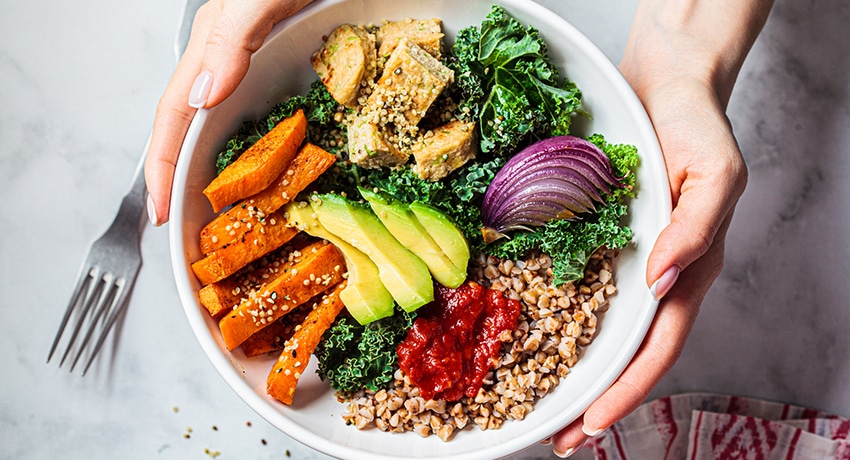If you’d like to know the secret for health, fitness, focus, and energy, it’s simple: Eat plants.
For National Nutrition Month, Pritesh Mutha, MD, gastroenterologist with UT Physicians, recommends trying a plant-based diet.

“I recommend a low-fat, whole-foods, plant-based diet for multiple reasons,” said Mutha, associate professor of gastroenterology, hepatology, and nutrition with McGovern Medical School at UTHealth Houston.
“First and foremost, it not only can prevent the majority of chronic diseases, but it also helps reverse lots of chronic diseases and keeps you healthy overall. It’s the best diet to help keep you medicine-free and disease-free,” Mutha said. “In addition, it will make you feel more energetic, give you better mental clarity, and help with weight loss.”
The gastroenterologist, who is also board certified in lifestyle medicine, recommends eating vegetables, fruits, beans, nuts, seeds, and whole grains to meet and exceed all your nutritional needs.
“Plants give you vitamins, minerals, antioxidants, fiber, and even protein,” Mutha said. “Try to eat a rainbow diet. Fruits and vegetables have different colors that reflect different phytonutrients.”
It’s also best to cut out or significantly reduce processed foods (foods altered from their natural state) and salt, oil, and refined sugar from your diet. For optimal health, eat meals without any added fats and eat whole foods rather than food products.
For Elaine Mays of Houston, a plant-based diet relieved her of a painful condition and had other positive health effects.
“It was nothing short of a miracle, the effect the change in diet had in my body,” Mays said.
Mays went to see Mutha for chronic abdominal pain on her right side. After determining she did not have gastric cancer or any ulcers or infection, Mutha advised a plant-based diet.
“He provided a bunch of information about the low-fat, whole-foods, plant-based diet and suggested I give it a try. Over the next two to three months the pain became more rare,” Mays said. “After a while, I started to experiment and would try meat or cheese. Lo and behold, I would have that discomfort again.”
“I may still eat a little meat in social situations, but now I stick primarily with a plant-based diet,” Mays added.
Mays started the diet to end her bodily pain, but she stays with the diet for the rejuvenating benefits.
“I have more clarity of thought, and I have less achiness and joint pain. I also have more energy,” Mays said.
Contrary to popular belief, a plant-based diet doesn’t make people weaker.
“I’ve learned that you can actually get all the nutrition and protein you need to be strong and healthy from plants,” Mays said. “In fact, I just watched a video that gladiators were determined to have a largely vegetarian diet based on examination of their remains.”
If you don’t believe you can give up or significantly reduce your intake of meats and animal-based products, Mays offers some simple advice.
“It’s easier than you might think, and it’s worth a try,” she said. “Don’t give up hope if you can’t do it perfectly. It’s something that you can do to the degree that you are able.”
Be sure to speak with a doctor or nutritionist before starting any new diet for guidance.


